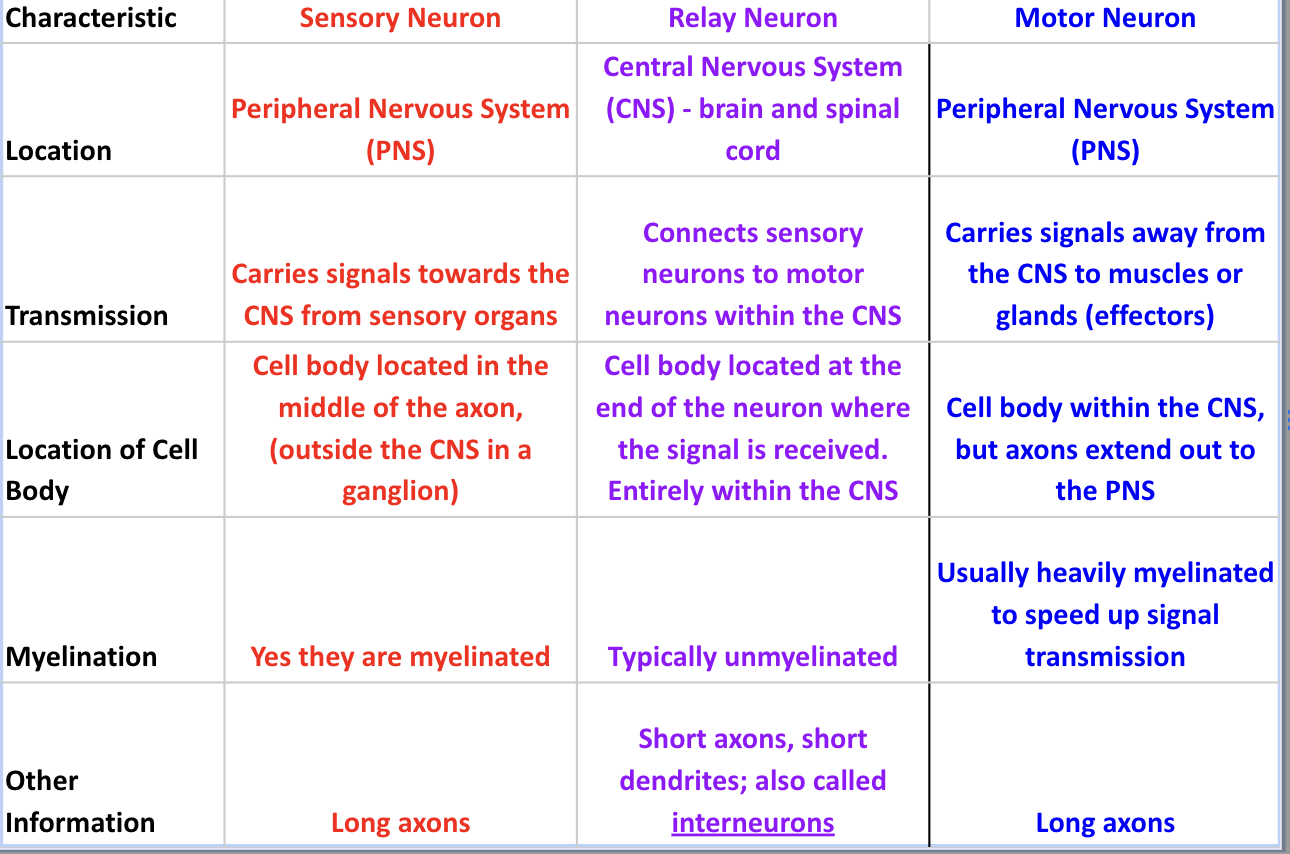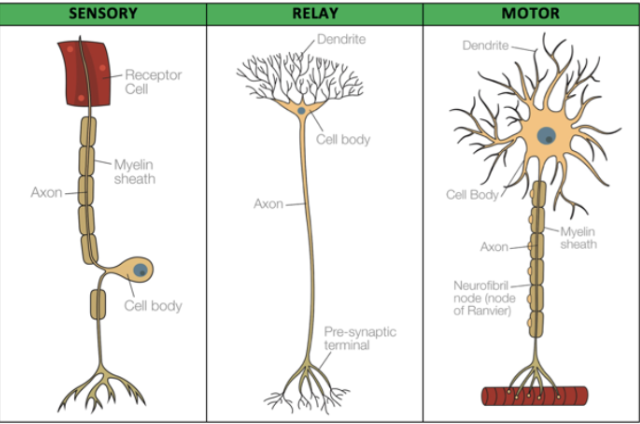Neural signalling
1/16
There's no tags or description
Looks like no tags are added yet.
Name | Mastery | Learn | Test | Matching | Spaced |
|---|
No study sessions yet.
17 Terms
What is the CNS, PNS, a neuron, a nerve, a synapse?
CNS: Brain and spinal cords
PNS: other parts of body connecting to the CNS
Neuron: cell that processes and transmits information through electrical impulses.
Nerve: Bundle of neurons
Synapse: Junction between neurons.
what does a neuron cell body consist of?
Nucleus, dendrites and cytoplasm and more.
What and how are the specific structures within a neuron adapted for its function of transmitting electrical impulses?
Dendrite: branched extensions of cell body receiving impulses.
Mitochondria: Produces ATP for sodium potassium pump
Long thin axon: Carries impulses over long distances
Myelin sheath: Electrical insulator to speed up conduction of electrical impulses.
Nodes of Ranvier: gaps in myelin sheath where action potential forms
For the three types sensory, motor and relay neurons, state the location, how they transmit, its cell body location, and whether its myelinated.


What is an example of a supporting cell of neurons?
Schwann cells which wrap around the axons of motor neurons to form the myelin sheath.
What is the resting potential of a neuron?
What produces / causes the resting potential of a neuron?
at -70 mega volts.
At this point the neuron is resting and the inside of the axon has a negative charge relative to the outside due to the uneven distribution of ions, primarily sodium and potassium.
The active transport of potassium in across the membrane and the movement of sodium out across the membrane. This is done by a potassium sodium pump.
3 potassium in and 2 sodium out, creating the negative charge
What is an action potential?
How is it achieved?
What happens after the action potential?
electrical signal a neuron generates to send information.
When sodium ions flow into the cytoplasm to depolarize the membrane changing the charge from -70 mv to 40 mv
Repolarization occurs as potassium ions exit the cell, restoring the negative internal charge.
What is the structure of a synapse?
connection between the end of a nerve cell and another cell.
Consists of the swollen tip of the axon of one neuron and the dendrite of another neuron. Between them is a 20 nm synaptic cleft gap.
In what direction can a signal pass across a synapse?
in one direction only - not two
How does an action potential cross the synaptic cleft?
Where is this substance produced?
by neurotransmitters which are small and diffuse quickly.
In the golgi apparatus and are held in vesciles.
What r value suggests good correlation and which one doesn’t.
r value close to 1 is good and r value close to 0 is bad. Wh
What factors affect speed of nerve impulses?
Amount of myelination since the action potential can jump from node to node and cover a large distance quicker.
Diameter of the axon as a larger surface area can propagate action potentials faster.
Temperature and size of the organism
How does the release of neurotransmitters from a presynaptic membrane happen?
arrival of an action potential at the synaptic knob changes polarity of the membrane which opens calcium ion channels. This calcium causes a reaction to release neurotransmitter substances. H
How does repolarisation and depolarisation help voltage gated channels?
Repolarisation and depolarisation cause a potential difference across the membrane that opens or closes voltage-gated channels.
How is the action potential propogated or expelled/made move.
a wave of depolarisation caused by sodium influx
What is the effect of drugs on synapse eg cocaine?
What is the effect of neonicotinoids? ie pestecides.
drugs inhibit processes of synaptic transmission and blocks the re uptake of neurotransmitters
Pestecides block synaptic transmission as they bind to acetylcholine and inhibit synaptic transmission.
How does the brain detect pain as a stimuli?
The brain detects pain stimuli through neurons by transmitting signals from pain receptors via sensory neurons to the spinal cord and then to the brain, where the signals are processed.